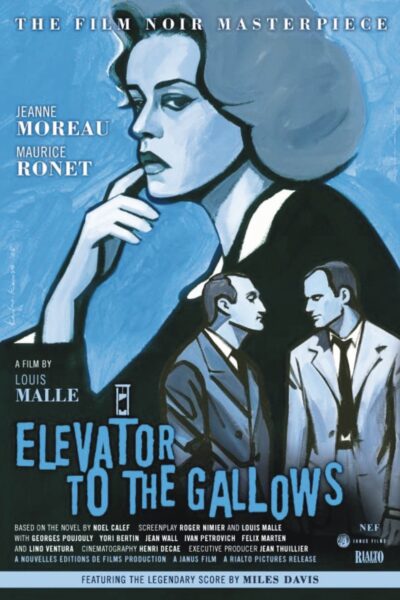"What a supremely stylish and watchable picture it is."
— Peter Bradshaw, Guardian
"Don't miss this opportunity to see the movie that launched the legend of Jeanne Moreau."
— Andrew Sarris, Observer
"Elevator to the Gallows married a new kind of jazz to a new kind of cinema, and created something altogether sublime."
— Tina Hassannia, Village Voice
"Few debuts come punchier, cooler, and more influential than Louis Malle's 1958 thriller about a Parisian murder plan unravelling, scene by fateful scene."
— Tim Robey, Daily Telegraph (UK)
"A classic European film noir with an irresistible score by Miles Davis, it builds tension from a series of seemingly minor mistakes that echo the political/military context of the postwar era."
— John Hartl, Seattle Times
"Lift to the Scaffold (Ascenseur pour l'échafaud) was the perfect opening to the French New Wave in 1958, sashaying in to a jazz score from Miles Davis and starring Jeanne Moreau as a mistress-in-peril"
— Kate Muir, Times (UK)
"What turns it fabulous, indeed mythical, is the presence of another entity: Paris at night in the '50s, to the tune of Miles Davis's score as realized in the dappled hues of Henri Decae's gorgeous poetic cinematography."
— Stephen Hunter, Washington Post
"Henri Decaë's black-and-white cinematography brings out the melancholy mystery of Paris' boulevards and cafes, and Ms. Moreau, shot with natural lighting and without make-up, is like a mournful goddess of glamour."
— Chris Vognar, Dallas Morning News
"Elevator to the Gallows is a treat for the film buff. Watching Moreau and Malle as they discover each other and a new trend in filmmaking, and listening to Miles Davis during their quest will remind you of what movies are all about."
— Marta Barber, Miami Herald
"Louis Malle's supremely stylish New Wave thriller combines Miles Davis's music, Henri Decae's wonderfully evocative black-and-white cinematography of Paris and plenty of close-ups of a young Jeanne Moreau looking very anguished."
— Geoffrey Macnab, Independent (UK)
"The way that Louis Malle shoots Jeanne Moreau—those are some of the most beautiful walking scenes I’ve seen. She’s walking in the rain with her head held high, lost in herself, mumbling, and with that amazing score being played by Miles Davis. There is something so modern about the film, and it feels like it opens so many doors."
— Sebastián Lelio, Criterion







